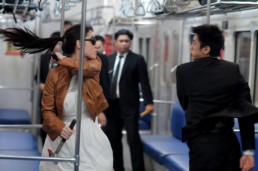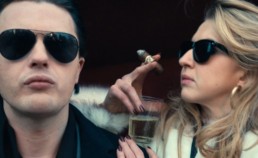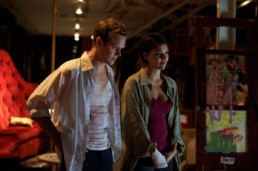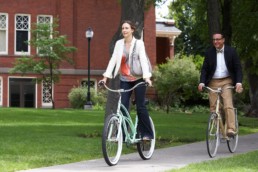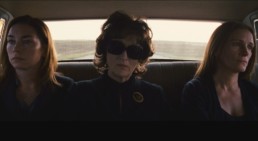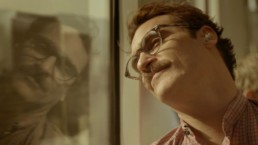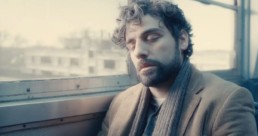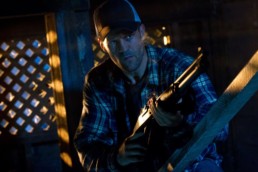Review: 'The Raid 2'
If all action film fans need from their movies is a serviceable enough story and a healthy (read: unhealthy) amount of action scenes, then The Raid 2 will meet all of those requirements and more. The "and more," here, is an eye-popping number of incredibly choreographed and directed action sequences that simultaneously glue your eyes to the flying fists onscreen, as well as all but force you to look away from the pain that's felt from the audience seats. For a movie so, fun, it would be off-base to lament how during the entire two and a half hours, the movie moves in a repetitive fashion, alternating between slow burning and serious dialogue scenes and manic martial arts stunts. The Raid 2, for being a guilty pleasure head smasher, is nearly incredible in terms of its huge scale and overall execution.
This sequel, the follow-up to 2011's The Raid: Redemption, takes off from the previous film's end (two hours, to be exact), as we once again follow the deadly-when-cornered Rama (Iko Uwai), who learns that in order to ensure the safety of his wife and infant child, must reinvent himself as an undercover cop to expose a corrupted crime syndicate between police and local crime boss Bangun (Tio Pakusodewu). Uwai as Rama is just so good in these Raid movies, and his casting is no accident. A trained martial artists since the age of 10 and a 2005 National Champion in the Silat Demonstration category, Uwai was discovered by the film's Welsh-born writer/director himself, Gareth Evans, when he visited Iko's Silat school for a documentary in 2007, and ended up asking him to quit his daytime job as a driver in a telecommunications company to star in his production company's movies. This film critic is glad that the chips have landed as such, as the low top Converse-wearing Iko in this film is simply arresting to watch, decimating his opponents in action sequences that seem to go on for tens of minutes without rest.
The Raid 2 seems to be that rare film that, due to logistical shooting and budgetary issues, surpasses its original in terms of both scale and entertainment factor.
According to Raid 2's IMDB trivia page, the sequel's story was written before Redemption, but when funding fell through, director Evans decided to shoot a film with a lower budget, which would become the first film in the Raid series. And the jump in budget shows. If this reviewer had to guess, I'd say that each fight scene consisted of more than forty stuntmen, give or take, and lasted at least ten minutes long, sometimes optimizing whirling and impeccably timed single takes reminiscent of a much less stylized 300 for further impress. An early mud-drenched prison yard scramble nearly had me second guessing my choice in second row viewing; a truly incredible car chase (after which, roads had to be cleaned from 6am to 6pm) had me mouth agape and wondering how long it would be before Hollywood came knocking at the filmmaker's door asking for the secrets; and the final fight scene, with a pulverized Rama advancing through four different rooms to one of the most EP-ic mano-a-mano showdowns I've seen in a movie, left me all but drained of energy and senses (imagine how Iko must have felt). Needless to say, all of the other fight scenes were just as hilariously engrossing.
Though the story itself isn't one of equally inspired nature, as Bangun's less than trustworthy son Ucok (Arifin Putra) rises to power within the inner circle and threatens to break the peace amongst the other crime families, resulting in war, it is still all constructed neatly, albeit familiar. The dialogue and expository scenes, even if most end up in simple shot-reverse-shots between characters, extend to include scenes with smooth pans and creatively composed wide shots with artfully designed sets, adding a welcome aesthetic and deeper dimension to help hold the movie together.
As it usually goes, the sequel never, or rarely, holds up to the original, as the elements that made the first so unique and beloved are typically rehashed to no end. However, The Raid 2 seems to be that rare film that, due to logistical shooting and budgetary issues, surpasses the first film in terms of both scale and entertainment factor. If you have the stomach, or willpower, to watch hyper-violent action where limbs snap in every possible direction, The Raid 2 will show you just how good an action movie can be, for action movie's sake.
https://www.youtube.com/watch?v=MG9uFX3uYq4
Review: 'Rob the Mob'
It would seem that rebel couples make the best criminal partners. Or rather, the most entertaining ones. Inspired or not by the real life gangsters Bonnie and Clyde, Rob the Mob tells a similar-enough story of two young lovers turned small-time crooks when they decide to steal from the kitties of the high-powered Italian Mafia families of 1991's Queens, New York.
Rob the Mob's hip, snappy title provides a good idea of what you should expect to get with this movie, as this crime-drama benefits from a regular dosage of sly attitude and charm from its leading gunslingers. As the real-life Mob mugging duo Thomas and Rosemarie Uva, Michael Pitt and Nina Arianda carve out a good piece of the crime couple cinematic landscape that has been all but missing from movies since we last saw the googley eyes of the wanted lovers in 1993's shockingly sharp, Quentin Tarantino penned True Romance.
The actors' chemistry is apparent in the film's first frames, when we see Tommy and Rosie's relationship, whose constant shouting matches-turned-make out sessions show the passion that leads them to attempt to (unsuccessfully) hold up a flower shop one Valentine's Day, landing him in the clink and her trying to make good with a telemarketing gig. Years later and fresh out of prison, the pair reconnect, and now face a grown-up life with bills to pay and groceries to buy, much to the dismay of both, but there's no killing their romance. A now cleaned up, all work and no play Rosie makes Tommy a dull boy, and so he finds himself stumbling into the landmark trial of Gambino-family boss John Gotti, where he spends his days soaking in testimonies galore that place in his head the knowledge that Mafia social clubs don't carry firearms, and plant in his head the idea to make use of that information, and rob them.
Much of the movie's heavy lifting is placed on Pitt and Arianda, and they are more than up to the task to step up. However, it's the mood, look, and tone, which captures the 90's-set New York inner city life in various and appealing locations, that director Raymond De Felitta (City Island) brings successfully to the big screen. Each scene, whether set in the boring cubicle office space, to Tommy and Rosie's furniture-less shared apartment or in the Mob's social clubs themselves, feels big and full of rich storytelling though the feeling retains its intimacy. Slightly oddball characters fill in some of these scenes, which add another jolt of punk humor.
Don't underestimate the talent on display here; if you do, they might just pull a fast one on you.
After a string of successful Mob heists, the activity gains the attention of FBI and Mob reporter Jerry Cardozo (Ray Romano), whose curiosity attracts him to covering their stories. On the other side of the moral tracks, the embarrassing hits make their way up the chain to Mob boss Big Al (Andy Garcia), whose initial, calm, reluctance to "take care of" the cocksure criminals is deemed a mistake, when Tommy and Rosie get their hands on an invaluable item that could bring the entire Mob community down.
The billings of Ray Romano as the sympathetic reporter, who champions their cause and story (getting so far as to profile the notorious duo), and Andy Garcia, as the measured and wise old crime boss, are worthy additions here. Even if Romano can't seem, or doesn't try, to break from his already made, New York casual-ness character, he is still a friendly face with the utmost of trustworthy of intentions for the audience to rely on for moral centering. The work of Andy Garcia, meanwhile, shows a bigger hunger and eagerness, however dialed back and restrained it is, to sink his teeth into another character of depth. Although we see familiar tropes of "family first"-ness in Big Al's character, going as far to say that "love" is the most important ingredient in his famous home-made Italian dish, Garcia brings with him a presence that does more than enough to get the audience imagining his colorful and dangerous background for him.
While it's plainly obvious to see all the talent and craftsmanship on display here in this modestly-sized crime-drama, the shortcomings stem from its overall less than polished packaging. What gives each scene an appeal of life and energy, through a combination of loose shooting style and reactive performances, also waters down its larger vision. There is a lot on display here, sure; even the supporting story of the passing of Tommy's late father at the hands of the Mafia allows even more human elements to be felt. But the emotions don't stick, and at the end of the day, it would be better for the movie's sake to decide which singular tone needs to be focused on in telling this story.
Ultimately, Rob the Mob, penned from scribe Jonathan Fernandez, has enough driving force in it, from the sum of all its parts (and in large part to Pitt and Arianda), to deem this a successful venture. Don't underestimate the talent on display here; if you do, they might just pull a fast one on you.
https://www.youtube.com/watch?v=IQR2sEdqBDk
Review: 'Art Machine'
If you're in the mood for an easy watching, just entertaining enough movie about the pains of artistic grief by way of existential angst, you might feel disappointed after watching the attemptedly-edgy yet uninspired Art Machine. Though a poignant story seems to exist underneath, the movie's much too formulaic and telegraphed story plays all too safe, for a movie about upsetting/transcending the conventional art world by upsetting the established order, no less.
Once a child prodigy painter, Declan's (Joseph Cross) life has lost all meaning. Especially living under the roof of his career controlling mother Prudence (Joey Laurence Adams), whose "prudish" character name is so painfully on-the-nose that it can't help but show as but one instance of the deliberate and mechanical storytelling on display here. The film introduces Declan, now grown up and without his previous critical and commercial success, in a rut of producing less than important or otherwise "good" art. Of course all things come to a head when he meets the manic pixie character, rebel guerilla artist Cassandra (Jessica Szohr) who, along with her fellow punk art collective do-badders, bring Declan in to let loose and join in the merry mischief within their law and art-world circumventing lifestyle. With a heaping of anarchic philosophy (and a touch of psychedelics), Declan stumbles into a new artistic world of inspiration, though with its dangerous and sprawling possibilities and a re-activation of previous mental disturbances, the troubled artist must decide whether his newfound artistic motivations are worth it.
With a heaping of anarchic philosophy (and a touch of psychedelics), Declan stumbles into a new artistic world of inspiration.
Art Machine ultimately goes to say that the "art world" (Brooklyn, NY being its backdrop) has gotten to a point of producing unchallenging and meaningless art, not unlike that of a rudimentary machine. While I would not go as far as to say that this film's detractors stem from a meaningless storyline, as it displays an intriguing premise about its contemporary questioning, the same defense can't be made that this outing has any sort of exceptional craftsmanship. We've seen the story of the sheltered, mama's boy of a millennial turn to dark times and mushrooms to achieve a higher functioning experience. We've seen the same goofy art click side-kicks with names like "Flash" and oppositely buttoned-up art studio sniffler "Serge," and here is where we remember that. Perhaps most evidently, even the "art" in the movie is doctored up as a means to an end that one can only guess the property department conjured up to simply qualify. Declan himself is presented as an artist whose work is supposed to speak for itself, but in this case, it all just screams "bad."
Though there might be one or two familiar faces in this low-budget clunker, the film itself doesn't have much in the way of entertainment. Unless your idea of a good time stems from watching the most watered down version of Fight Club meets art school, there's not a lot to fuss over.
https://www.youtube.com/watch?v=K5Ty06K7GIU
Review: 'At Middleton'
Whether college-aged kids or middle-aged adults, new discoveries can happen anytime. This sentiment is drawn out in an afternoon's worth of small scale adventures in the whimsical enough At Middleton. While the film intends to act as a quirky, fun, heart warming flick for older audiences, there is ultimately not enough bite taken out of life on display here that is worth applauding over.
While the film's setup, that of two spouses taking their own children on a college campus tour "at Middleton," only to their finding attractions in the other's perfectly charming and compatible opposites, and stowing away for an episodic series of quirky adventures, seems innocently entertaining, there are real problems with the mechanics of the storytelling. While a devout champion for independent filmmaking, I fear that I secretly desire watching the same movie with a bit more money pumped into it. Meaning to say, there are some real problems here that more developed stakes (joyriding two perfectly unattended bicycles around the campus isn't all too thrilling) could really help.
Though with its totally loose and freely shooting nature, first-time feature film director Adam Rodgers is able to capture fun and freed performances from its star actors. Veteran film actor Andy Garcia, as do-gooder George Hartman (a bow-tie wearing heart surgeon), though tied to a one-note simpleton of a character, uses his grounded and deadpan seriousness to good comic and likable effect, while further entertaining with moments of Buster Keaton-esque physical comedy, a new turn for the Academy Award Nominee. Vera Farmiga plays Edith Martin, a free spirit who coaxes the buttoned up George out of his shell while solidly serving as the film's instigator. The two then take in the day "at Middleton," getting into lighthearted mischief like sneaking into buildings and running from campus police.
It would be unfair to nitpick at a movie like this, whose aspirations are to entertain with broad strokes and general funny circumstances for easy watching audiences, and it should be commended for its achievement as a fine, feel good adult comedy made on a shoe-string budget.
At Middleton is the kind of movie reserved for middle-aged adults in need of a few easy laughs (clueless tour leader Justin "Dingleberry" (Nicholas Braun)'s name serves as a consistent Seinfeld-ian "Newman" joke) and telegraphed romantic prospects. In the opening scene, we see that George's son Conrad (Spencer Lofranco) is on the fence about the esteemed school while Edith's ever more precocious daughter Audrey (Taissa Farmiga, Vera's real-life younger sister), is blisteringly excited about her soon attending. While a story like this could focus on these kids and their new-to-life point of views, they are quite literally, ditched, as the movie trades in the children's follies to center on the story of their parents: two "perfectly happy," yet unhappily married people, who use the day to act on their impulses of risk taking and, deeper yet, finding a sense of completion, true love, with the other.
It would be unfair to nitpick at a movie like this, whose aspirations are to entertain with broad strokes and general funny circumstances for easy watching audiences, and it should be commended for its achievement as a fine, feel good adult comedy made on a shoe-string budget. But there are still problems in its story, which hold it back from achieving anything more. Why do the adults abandon the children, if not to learn anything poignant and significant that they can, at the end of the day, come back to teach to their kids, who they left on the family outing? In fact, there is no real happy ending here. When the tired likes of George and Edith, getting back into their cars at the end of a full day's worth of kindling a newfound love with one another, through various wacky shenanigans (including, unnecessarily, the enjoyment of a bong with undergrads near the end of the film, and perhaps even past the film's proper climax), they must acknowledge their own sense of dissatisfactions as they return to their unfulfilled lives. Somehow, audiences might not resonate with their disappointment that the day is finally over.
https://www.youtube.com/watch?v=0oBkGzydFIw
Of Course Meryl Streep is a Volatile Wonder in 'August: Osage County'
The holiday season is typically a time for families to come together, to enjoy each other's company and time spent together.
A time when the mere act of being in the presence of each other signifies the love shared by all. One does not usually hear an outspoken daughter command her acerbic mother at mealtime to "Eat the fish, F**ker!" This is the case, and family, in August: Osage County.
From the Weinstein Company and director John Wells (Company Men) comes the story of one divided nuclear family, the Westons, reuniting after one devastating event, bringing them all back to their old childhood Midwestern home along with all of the bad blood stirred while living under the roof of the harsh matriarch of the family. As adapted from the stage, from Tracy Letts' Pulitzer Prize and five-time Tony Award-winning play (2008), the film runs rampant as a rich, dense, family drama, comprised of equally rich and dense dialogue of scenes shared between veteran, experienced actors.
As the pill addicted, volatile mother Violet Weston, Meryl Streep makes (yet another) incredible turn with one of her most evocative performances yet, an accolade and claim any movie reviewer would not make lightly. Streep as Violet drives the movie, like a high-performance car, shifting gears with the most subtle and refined moves and touches to the most manic and crazed, all maneuvered with the skill, intuition, and control of a seasoned professional who knows her track. Violet, in one minute ethereal and dazed from her cocktail of pills, turns on a dime to become a scathing and acid-tongued mother of three and sighing husband Beverly (Sam Shepard).
As a feature length film, the story is all in the chemistry of the acting.
With Violet as the hurricane of the family's epicenter, it's no stretch to see the rest of the characters so incredibly "screwed up" with such driving and believable conviction. Commanding the Weston troops is the eldest daughter, hard-nosed and dominating Barbara (Julia Roberts), whose frustrations with dealing with her mother extend to that of dealing with her failing marriage to husband Bill (Ewan McGregor). As a dense, dialogue-driven family drama of a film, whose DNA comes from the savvy stage play, it hangs its hat on its veteran actors and performances. From Streep and Roberts, their impassioned acting packages the whole film and sets the series of events on a rightful due course. Roberts returns to the screen at the top of her game. Accompanying the mother-daughter combo is a star-studded cast of impressive talent. Chris Cooper, Abigail Breslin, Juliette Lewis, Benedict Cumberbatch, and Dermot Mulroney fill out the cast, delivering dutiful performances that add good measure.
As a feature-length film, the story is all in the chemistry of the acting. There is a recognizable effort on director Wells Part to gently nurture and bring the rich stage play to life with an exciting film sense, a hearty challenge to be done. For all of its might, however, if you don't find yourself lauding over the actor-driven framework, there might not be much else for you to sink your teeth into.
AUGUST: OSAGE COUNTY (2014)
Starring Meryl Streep, Dermot Mulroney, Julia Roberts
Directed by John Wells
Written by Tracy Letts
Distributed by The Weinstein Company. 121 minutes.
Review: 'Her'
In this day and age, it wouldn't be a stretch to say that people love technology. That people are in love with technology. But why? Why does any person obsess over it, waiting for days outside of any Apple store to get their hands on the latest and greatest technological gadgetry? With his latest technology-obsessed love story Her, director Spike Jonze presents the story of a man (and culture) in love with technology for one simple reason: to connect.
For what you might already know, or not know, of the indie filmmaker Jonze, his palette of past movies has always leaned towards common thematic workings of totally absurd happenings occurring in very real worlds. Whether it's the finding of a portal leading into the head of actor John Malkovich (1999's Being John Malkovich) or discovering the novel-come-to life (2002's Adaptation), Jonze's style and storytelling has always been set in creating wonderfully warm and weird movies that, through all of the odd ball absurdities, speak to the human condition at the heart of it all.
The same commonality, thematically, is seen here. But where Malkovich and Adaptation were birthed from the wacky-meta head of the great screenwriter Charlie Kaufman, Jonze offers up his first feature as both writer and director. Where the previous film's operated in Kaufman's highbrow and lofty headspace, Jonze's more meek and gentle nature makes Her his most accessible, and emotionally yearning and vulnerable, films to date.
Her may end to stand as one of the most well received of Jonze's work, as well as any to be released this year, or any in recent times. The overall "problem," a civilization of cell-phone and computer-devoted individuals existing merely alongside rather than with each other is as cautionary a tale as it is an astute observation about where the Millennial generation is seen to be headed. Where Jonze shines in this depiction is of how he chooses to show this world. Where it might be easy enough to tell a production designer to create sets that are "dark" and "cold" so that the "flickering chance" of real "love" can more easily be contrasted against and seen, the world that has been created is one of pure lushness and impress. The cliché architectural coldness has been exchanged for a warm, impeccably designed world, where smooth corners and tailored pastel garb populates a high-rise infested city that still feels homey. With flourishes in its camerawork, the overall look and design in which its characters participate in is one of applaudable beauty.
The ambition that Jonze sets out to conquer, in writing, directing, and acting, is fully exacted in this philosophically-stirring yet, sure to be commercial/critical hit.
Though, unfortunately, not all of the characters get to see this mesmerizingly attractive world. Not in the literal sense, anyway. For one character, "Samantha" (Scarlett Johansson), the love interest in the film, is merely an Operating System. This poses a self-made problem for one lonesome soul, a simple man who stumbles into falling in love with the code of 1's and 0's. The man in question is Theodore Twombly (Joaquin Phoenix). Recently divorced from real life Catherine (Rooney Mara), Theodore spends his days as a hand written letter dictator (at the imaginary Beautiful Handwritten Letters), creating falsely authentic sentiments for real people. When Theodore learns of new OS's (as the operating systems are so casually referred to) that help organize your life, he decides to create one, selecting a "female" voice as a starting place. The ending place, however, results with him developing a real connection with Samantha, going so far as to fall in love with the also devoted and serving OS.
The magic in the film ultimately hangs on the believability and truthfulness felt for the characters and above premise. For all of the entertaining bells and whistles the "Spike Jonze love story" has, the real reason why this movie is simply a winner comes down to how well Theodore and the pocket-sized camera Samantha's relationship is captured onscreen. Phoenix, however off-putting his off-screen persona you find to be, still proves to be one of this generation's greatest actors. The simple (read: amazing) task of acting in a love story where nearly 90% (89.8%, for all you statisticians) of the film's effectiveness relies on the performances of constantly-rolling close-ups in the most emotionally compelling and driving scenes in the film, is one of the most fascinating acting endeavors seen this year. Phoenix steps into more popular leading man shoes, leaving behind both his drugged out turn "as himself" in 2010's negatively received I'm Still Here as well as the mentally-manic drinker Freddy Quell in last year's The Master, as a more relatable looking for love character, and to great effect.
In a further showing of acting hoop-leaping, the "performance" of Samantha herself by Johansson is already leaving audiences in a tizzy. As a replacement for the on-set voice of Samantha (Samantha Morton), who read/acted off-screen to Phoenix in the movie, Johansson stepped in to record over her voice in post-production, as a change in direction was decided by Jonze when editing the film. With a role, and film, that hangs so much on just the voice of the actress, arguably needing to act in even greater specificity to properly convey the sentiments in a solely auditory way, Johansson steps up to the plate big. When she vocally exhales at one point in one of her and Theodore's conversations, he asks why she did it. She responds that she thought it was just a cultural communicative quirk and way in which to respond to people, an insightful perception on Jonze's part. With her very feminine, very sexy, very warm rasp of a voice, Johansson creates a Samantha that we want to know, and listen to, and when her own character begins to evolve and transform in new and unexpected ways, we want to keep being there, keep loving, keep connecting with her, even when we ultimately can't.
The ambition that Jonze sets out to conquer, in writing, directing, and acting is fully exacted in this philosophically-stirring yet, sure to be commercial/critical hit. After the screening, it had me jumping right into the conversation of our culture's obsession with technology, what "love" even is, and who "people" even are. Her is a modern day masterpiece, romantic, comedic, and dramatic all at once, and all told at the most perfectly receptive and telling of times. At the very least, watching this film with a friend will make for a shared, communal experience, that at the very end, you might both share an exhale, and signify the uniqueness and specialness of how we still connect.
https://www.youtube.com/watch?v=ne6p6MfLBxc
Review: 'Inside Llewyn Davis'
“If it was never new, and it never gets old, then it’s a folk song," says Llewyn Davis, after opening the movie with a smoky rendition of "Hang Me, Oh Hang Me."
By god, this film is an unapologetic folk song.
Brothers Joel and Ethan Coen may have just offered their most telling of films from their self-made canon with this 60's-set folk ballad, Inside Llewyn Davis. Like the all-too-important line as muttered above, the film's story isn't a new one. Heck, even the title is lifted from the 1963 folk record, Inside Dave Van Ronk, from an American folk singer who (more or less) inspired the film, and whose songs and a half benchmark the film, including the opening number's. The story doesn't offer any cleverness in its plot, which makes it one of the most clever films of the year. It doesn't set out to tell you some new "original" take of a wandering troubadour, even though it's one of the most original films of the year. Simply, you're going to get a film of self-packaged simplicity, and may even walk out of the theater thinking, "That's it?"
Yes. That's it.
The Brothers' latest writing/directing effort whittles out all the excess, whittles out all the frill, all the weight of story itself, making this film as simple and bare-bones as any of their film's have dared to be. It's enough of a self-aware statement to think that the Coen's, masters of storytelling, asked themselves here, what is 'story'? Is it something far-reaching, universally-spanning?, or is it about a vagabond who finds a cat?
Without tripping into postmodern territory, the absences of things here are what give the film its ultimate meaning. The film is comprised wholly of vignetted scenes, in which our hero Llewyn Davis (Oscar Isaac) yields his guitar all around the Greenwich Village, climbing in and out of apartment windows for a couch to sleep on while trying to scrape together royalties from his previous musical-duo act's record. After his partner jumps off the George Washington bridge, Davis is left as a one man band, a one-man world.
There is a sly irony here, so presently felt under the surface of it all. It's the story of a non-story.
Llewyn Davis himself is a man guarded, defensive, and just self-serving. It's not that he has ill-intentioned affections for anyone; it's just that his sense of self-lost makes it that much easier for those around him to be splattered with the mess he leaves wherever he goes. He's seen as selfish, but only through the guise of other characters' classifications. When the hate-harboring Jean (Carey Mulligan) blasts Davis for impregnating her and for his general lack of worldly care, its seen as just another instance of a comedically karmic world coming down hard on him. Isaac as Davis is warm, and plays the humor of each situation with his good senses, making his Davis a wholly watchable and sympathetic one.
Watching this film is both a visual and audible treat in the most cinematic of senses. The lensing, washed out colors, placing of the camera, and editing, are all masterful achievements, for a 'Cohen Brothers' film or any. Each element is married together in such a way that the singularly specific writing and directional cues are felt in every frame of the movie. There is a real language here, and it holds your hand to lead you through the picture in such a rewarding way. And of course, with another lovingly devised score with the aid of music man T. Bone Burnett (who put bluegrass music on the pop music market with 2000's O Brother, Where Art Thou? hit, "Man of Constant Sorrow"), its enough to sit back and see Llewyn Davis play a full length song with minimal coverage at any point in the movie.
Again, the absence of its story is what ultimately sets this one aside from any of the Cohens' others. Some will not care for this style, though I'd argue that this instance was flirted with in 2009's A Serious Man. Where we saw more colorful strides in that film's story of a man beholden to the universe's ultimate plans, we see that same theme even further matured, further experimented, and further rewarded here. Davis certainly stands out as a much welcomed return after 2009's so-so standard True Grit. Though it won't wet the appetite for 2007's sprawling Best Picture Winner fans No Country for Old Men, or even the aforementioned O Brother, Where Art Thou? In O Brother, the literary master work The Odyssey is the story's plot; In Davis, the literary master work Ulysses is the name of a cat.
Now about that cat.
The orange furball is such a lovable part of the film. It's certainly a must-include in all of the reviews that can accurately critique the movie. The cat that comes into his life sets the story in motion. It comes, and it goes, for Llewyn can't take care of any living thing, let alone himself. The cat plays as influential a role as does pop-loof Jim (Justin Timberlake) or mysterious curmudgeon Roland Turner (John Goodman). The feline's illusiveness, its penchant for slipping in and out of open windows, follows the journey, and for that matter, significance, of our own protagonist's.
There is a sly irony here, so presently felt under the surface of it all. It's the story of a non-story. A double sided coin that can be flipped deeming 'importance' or 'non-importance,' of 'never-new' and 'never old,' spun from any current or answer that blows in the wind. It's a coin that should be held onto and cherished for such emotional and thematic pondering and remembrance. Or, simply, spent to catch the next bus to nowhere.
https://www.youtube.com/watch?v=eXMuR-Nsylg
Review: 'Homefront'
Though I will now tread on the following cliché, there's certainly trouble here on the homefront. Both, in the plot of the new "Jason Statham movie," Homefront, as well as in the so-so mechanics of that movie itself. It's not that there's any offensively bad filmmaking going on here- the pegs of the family rivalry storyline all fit nicely in their holes, which makes for easy entertainment (if you call guns a-blazing warfare and smashing heads into cars easy entertainment.)
However, what the movie lacks in creativity are enough interesting pieces at work here. Screenwriter Sylvester Stallone, ever the subtle writer, pens an earnest enough father and daughter story at the heart of this Southern shoot-em-up. Though given points for crafting a story centered with real heart and believable character motivation, these moments of Phil and Maddy Broker (newcomer Izabela Vidovic) are as flagrant and obvious as Statham's fight scenes, which successfully utilize the star and excite the audience, making watching this action flick one of the more likable.
It's a muscle-y, gritty, action thriller, with a protective father and loving daughter story at the center.
Adding to the interesting things in this movie is the inclusion of both James Franco and Winona Ryder, playing their most impressionable southern white trash selves. Franco, as Morgan "Gator" Bodine (as hilariously conceived a villain name I've heard), plays the local badass who finds himself needing to scare off the newly-in-town badass Broker, and Ryder as Sheryl Marie Mott, his devoted girlfriend. What's interesting about Franco's antagonist here is that he might be the most reluctant bad guy ever, as we see that his appetite for destruction only comes out when his junkie sister Cassie Bodine Klum (played by a convincing and well-acted Kate Bosworth) asks him for favors, either selling her drugs or "scaring" off the Broker family after a run-in Maddy and Cassie's son had at school. Instead of hot and fiery, Gator comes off as a simple guy who's just plain inconvenienced to be a bad guy instead of thriving it it, which no doubt stems from Franco's signature apathetic showmanship. An interesting casting choice, the inclusion of Franco is just confusing and actually highlights the incredulity of the movie.
Statham plays well here (even if he doesn't play well with others). As Phil Broker, a former undercover field cop newly moved into a small town for his protection from a biker gang, you don't have to imagine how well trained in combat this normal civilian and father is. There is enough action and bad guys that come his way, with Gator's gang and the former bike gang, who both have an investment in the meth trafficking game that Broker disrupts. I would argue that the entire drug dealing storyline is unnecessary as if Stallone decided to front-load the story with even more cliché dealings, which, if left out of the movie, would have really strengthened the element of the rivalry.
Set on a big enough and visually interesting stage, with brutal action scenes and A-list Hollywood stars, Homefront works. It's a muscle-y, gritty, action thriller, with a protective father and loving daughter story at the center. But it's also a movie so obvious and heavy handed that the characters that get socked by Statham are sometimes not the only ones left groaning.
https://www.youtube.com/watch?v=tjSOj8b804U

